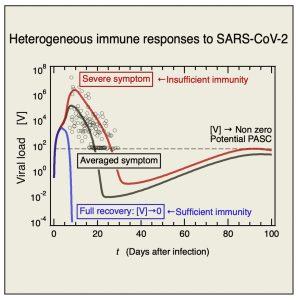Recently, researchers have described the patterns of immune system disruptions which can lead to long-term or severe COVID-19 (Figure 1).
Infection with the SARS-CoV-2 virus which leads to COVID-19 disease has wreaked havoc on global health systems and lead to a massive global shift in our we approach daily life. The disease presents itself in several varying ways whereby the severity of the disease differs from person to person. This has led scientists to believe that how one reacts to the virus is host specific. In this paper, the researchers describe how the host immune system dictates the level of persistence or severity of COVID-19.
Using mathematical models with an input of large data sets describing human immune responses to COVID-19 and more, they were able to model and show that during initial infection dendritic cells were activated and antibodies increased against SARS-CoV-2 increased in number.
Longitudinal investigation commenced with the team looking at the activity of dendritic cells after 7 months following infection. This modelling revealed that dendritic cells decreased during the peak of infection and subsequently increased in number again. The level of activity and number, however, remained low, representing pre-infection levels. This showed that these low levels were associated with robust long-term infection.
The final step in this study was to understand the function of dendritic cells in terms of disease severity. Low levels of antigen-reporting dendritic cells and low interferon levels showed a positive correlation with disease severity. This also resulted in a higher viral load and inability to clear the virus effectively.
In this study they were able to predict that consistent reduction of dendritic cells correlated with the inability of patients with severe and even mild symptoms to eliminate the virus, increasing their chance of developing long COVID. Improving our understanding of these immune responses can help improve therapeutic interventions.
Journal article: Sumi, T, et al., 2022. Immune response to SARS-CoV-2 in severe disease and long COVID-19. iScience.
Summary by Stefan Botha











